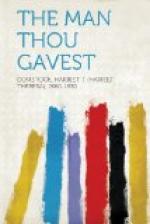Alone in the little room, later, he let himself go. Burying his tired head upon his folded arms he gave himself up to waves of recollection that threatened to engulf him. Everything was as it always had been—a glance proved that. When he had parted from his uncle he had taken only such articles as pertained to his maturer years. The pictures on the walls—the few shabby books that had drifted into his lonely and misunderstood childhood—remained. There was the locked box containing, Conning knew full well, the pitiful but sacred attempts at self-expression. The key was gone, but he recollected every scrap of paper which lay hidden in the old, dented tin box. Presently he went to the dormer window and opened it wide. Leaning out he tried to find his way back to Pine Cone—to the future that was to be free of all these cramping memories and hurting restrictions—but the trail was too cluttered; he was lost utterly!
“It is because they do not know,” he thought. “After to-morrow it will be all right.”
Then he reflected that the three thousand dollars Lynda had mentioned would clear every obstacle from his path and Nella-Rose’s. He no longer need struggle—he could give his time and care to her and his work. He did not consider the rest of his uncle’s estate, it did not matter. Lynda was provided for and so was he. And then, for the first time in many days, Truedale speculated upon bringing Nella-Rose away from her hills. He found himself rather insisting upon it, until he brought himself to terms by remembering her as he had seen her last—clinging to her own, vehemently, passionately.
“No, I’ve made my choice,” he finally exclaimed; “the coming back unsettled me for the moment but her people shall be my people.”
Below stairs Lynda was humming softly an old tune—“The Song of To-morrow,” it was called. It caught and held Truedale’s imagination. He tried to recall the lines, but only the theme was clear. It was the everlasting Song of To-morrow, always the one tune set to changing ideals.
It was the same idea as the philosophy about each man’s “interpretation” of the story already written, which Conning had reflected upon so often.
At this time Truedale believed he firmly accepted the principle of foreordination, or whatever one chose to call it. One followed the path upon which one’s feet had been set. One might linger and wander, within certain limits, but always each must return to his destined trail!
A distant church clock struck one; the house was still at last—deathly still. Two sounded, but Truedale thought on.
He finally succeeded in eliminating the entangling circumstances that seemed to lie like a twisted skein in the years stretching between his going forth from his uncle’s house to this night of return. He tried to understand himself, to estimate the man he was. In no egotistical sense did he do this, but sternly, deliberately, because he felt that the future demanded it. He must account to others, but first he must account to himself.




